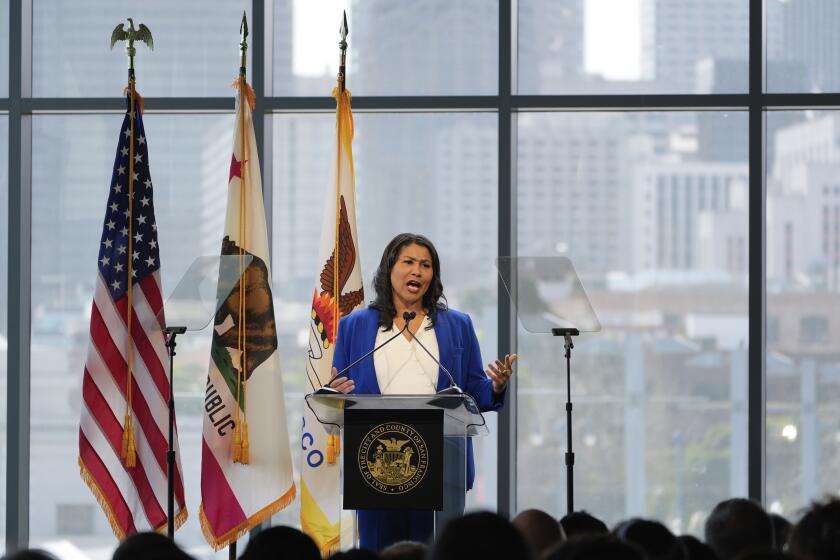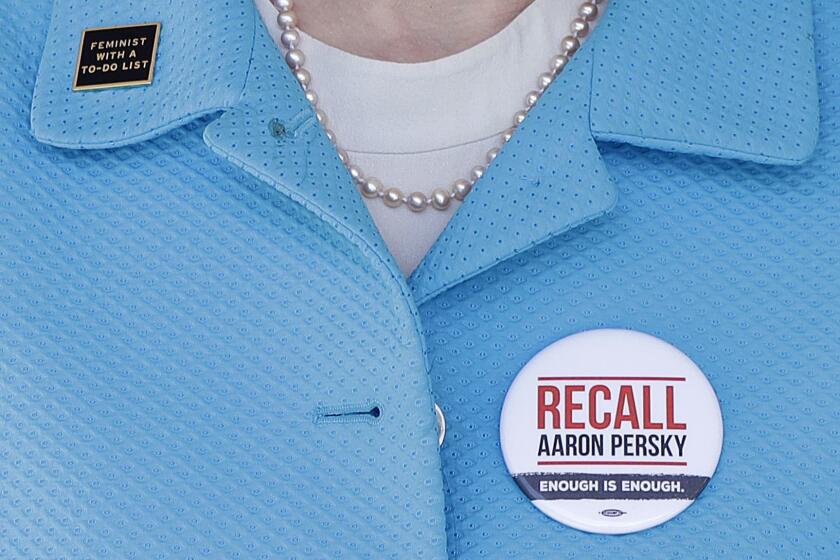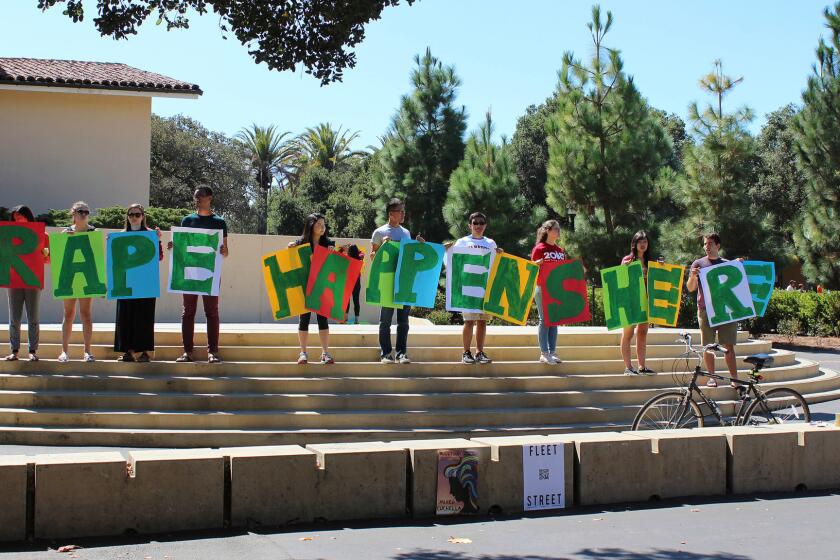Editorial: San Francisco voters rejected the removal of two judges. It’s a win for independence in the court

San Francisco voters made national news in the March primary election by adopting two ballot measures that until recently would have been unthinkable in their famously liberal city. The measures to expand police powers and require drug testing of welfare recipients were largely funded by tech and real estate billionaires, and passage was fueled by widespread frustration with homelessness, drug addiction and car break-ins.
But voters importantly said “no” to an attempt by the same movement to oust two San Francisco Superior Court judges for supposedly being too “soft on crime.”
In a bid to address the city’s drug crisis — and the crime and homelessness that come with it — San Francisco voters shifted right in Tuesday’s primary, approving ballot measures that aim to boost enforcement powers.
The challenges to Judges Michael Isaku Begert, appointed by Republican Gov. Arnold Schwarzenegger, and Patrick Thompson, appointed by Democratic Gov. Gavin Newsom, were ominous. This was not because their opponents might have brought an ideological shift to the bench but because their removal would have politicized the court and undermined its independence.
There is inherent tension between judges’ accountability to the public and their ability to render rulings based solely on the law and the facts of each case, free of popular sentiment or political pressure.
In a San Francisco case about unhoused people’s rights, arguing that judges are stopping cities from trying to fix homelessness doesn’t pass the smell test.
In California, Superior Court judges may be challenged at the polls every six years. The system is a check on bench officers who perform poorly, for example by failing to show up for hearings or treating litigants disrespectfully.
But the system can be misused as well. The same big-moneyed interests that want to sway the outcome of a ballot measure such as the recent two in San Francisco can also seek to stock the court with judges who will favor the donor’s business or political interests — or punish those who don’t. A judiciary that responds to the public mood because judges fear election challenges has relinquished its adherence to the law.
If Aaron Persky were the only judge affected by Tuesday’s vote to boot him from the Santa Clara Superior Court — in response to his too-lenient ruling in the notorious Brock Turner rape case — that wouldn’t be a catastrophe.
That’s a problem regardless of whether the challenge to competent judges comes from the right or the left. In 2018, for example, four deputy public defenders challenged four San Francisco judges appointed by Republican governors. That would have been a large shift in a relatively small court of 31 bench officers, and could easily have made every judge, whether challenged or not, consider the political ramifications of their rulings. Voters wisely kept their incumbent judges in place.
It was a different case in Santa Clara County, where voters in 2019 recalled Judge Aaron Persky because of unhappiness over his sentence for Stanford swimmer Brock Turner after he was convicted of sexual assault. The six-month sentence was shockingly lax, but within the law at the time. The recall put public outrage ahead of the judge’s individualized determination given the facts of the case and the law.
For the first time in three decades, The Times recommends the ouster of an incumbent judge. Another challenged judge should be reelected.
The same year, Democratic challengers swept every Republican judge off the bench in Harris County, Texas, where (unlike in California) judicial candidates run in partisan elections and tout their party affiliations. Harris County is dominated by Houston, which is more liberal than the rest of the state.
To many on the left, a Democratic takeover of the courts in deep-red Texas may sound like a triumph. But the same popular moods that politicize the courts one way could easily move in the opposite direction at another time or in another place. That’s exactly how it is supposed to work in elections for mayor, sheriff or district attorney. It’s not the way it should be for the courts.
Hundreds of thousands of people have signed petitions calling for the removal of Santa Clara Superior Court Judge Aaron Persky because of his disturbingly light six-month sentence of Stanford student Brock Turner for the 2015 sexual assault of an unconscious woman.
In Los Angeles County this year, Deputy Public Defender Kimberly Repecka challenged Judge Emily Theresa Spear and currently holds a slim lead. Repecka touts progressive principles and for that reason may be preferred by some L.A. voters over Spear, a former prosecutor. The Times endorsed Repecka, not because of politics or ideology but because the judge fell below an acceptable standard of performance with excessive unapproved absences from her courtroom.
It was the first time The Times had endorsed a challenge to a sitting judge since 1992. That year, the editorial board called for the defeat of Judge Joyce Karlin because of her probation sentence for Soon Ja Du, the Korean American grocer who shot Latasha Harlins, a Black 15-year-old girl, to death in Du’s store. The killing was widely seen as a spark for the deadly and destructive riots that year.
The board wrote at the time that Karlin’s “stunningly inept” sentencing reflected “a lack of fairness impairing her ability to sit as an impartial judge.” It’s a reminder that it can be difficult to distinguish between simply disagreeing with a judge’s ruling and finding it to be evidence of professional ineptitude. The editorial board’s principle on the issue of judicial independence has not changed in three decades, but the way it applies it, much like the way a judge might apply a sentencing law, has evolved.
Voters reelected Karlin.
“Justice is not a popularity contest,” Karlin wrote in response to The Times’ endorsement against her. “The law is not up for bidding among politicians, pressure groups and vocal bullies who think disagreement means one has the right to trash the entire judicial system.”
San Francisco voters may have slowed the politicization of the courts this year. But absent a change in the way we select and unseat judges, it is unlikely to go away anytime soon.
More to Read
A cure for the common opinion
Get thought-provoking perspectives with our weekly newsletter.
You may occasionally receive promotional content from the Los Angeles Times.















